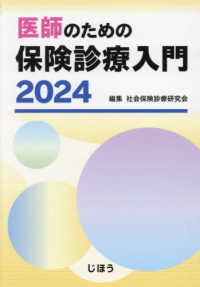- ホーム
- > 洋書
- > 英文書
- > Psychology
Full Description
In Wittgenstein on Freud Reexamined, psychoanalytical therapy is interpreted with the Wittgensteinian term language-game. Both terms are embedded in their different practical horizons of use, rich in content, and share a familiar context of everyday language. This book is an extensive and detailed investigation of the primary sources. An original perspective on psychoanalytical therapy emerges from rereading Freud and Wittgenstein through the primacy of language in their work. The possibility of significantly expanding the use of language-games results from a careful examination of the beginnings of psychoanalysis. Wittgenstein's ambivalent attitude toward psychoanalysis appears in a new light.
Contents
Introduction
1 Two Biographies: Sigmund Freud and Ludwig Wittgenstein
1 Freud's and Wittgenstein's Works and Their English Translation
2 Freud - Translator and German Language Master
3 Wittgenstein - English Translations of His Works
2 Ordinary Language-Games
1 Ordinary Language Philosophy
1.1 Why Ordinary Language?
1.2 Linguistic Misinterpretations
1.3 A Perspicuous Representation
1.4 Roots of Perspicuous Representation
1.5 Perspicuous Representation and Psychoanalysis
1.6 Mythology
2 Poetics of Ordinary Language
2.1 Wittgenstein on Poetics
2.2 The Poeticality of Wittgenstein's Works
2.3 Freud on Poetry and Cultural Linguistics
3 Language-Games - Speech-Action-Interweaving
3.1 Language-Games: Their Diversity and Relations to Practices and Mythology
3.2 Language-Games and Their Rules
3.3 Language-Games and the Meaning of a Word
3.4 The Aims of Language-Games and Practices in Philosophy
3.5 The Aims of the Psychotherapeutic "Talking Cure"
4 Language-Games of Persuasion
4.1 World-Picture as a Rock-Bottom or Construction: Wittgenstein - Freud
4.2 Reasons versus Different Kinds of Persuasion
4.3 Loose and Strong Sense of Persuasion
3 Philosophical and Psychoanalytical Treatment
1 Freud's and Wittgenstein's Attitude toward Treatment by Hypnosis
1.1 Freud: Hypnosis as a Method of Treatment
1.2 Hypnosis Session Seen as a Kind of Language-Game
1.3 Wittgenstein's Practicing of Self-Hypnosis
1.4 Wittgenstein in Dublin - the Recollections of Maurice O.C. Drury
2 Wittgenstein's Philosophy as Therapies
2.1 Therapies of Language Mistakes
2.2 Therapies of Existential Worries
3 `Language-Games of Psychoanalytic Therapies
3.1 The Psychoanalytical Method
3.2 Setting and Its Dimensions
3.3 Examples of Language-Games of Free Association
4 Free Association - the Cornerstone of the Psychoanalytic Method
4.1 Rule of Free Association
4.2 Analyst and Analysand as Involved in the Same Language-Game Process
4 The Complexity of Psychoanalytic Treatment
1 Analyst - Analysand: Linguistical Team Work
2 Phenomena Accompanying the Psychoanalytic Treatment
2.1 Transference - Counter-Transference
2.2 Resistance and Repression
2.3 Regression and Fixation
2.4 Reverie - Unconscious Connection between Analysand and Analyst
2.5 Talking as Acting: Freud - Wittgenstein
3 The Novelty of the Free Association Technique
3.1 Critical Remarks about Psychoanalytical Therapy
3.2 Freud and Wittgenstein on the Therapies
4 Unconsciousness: Wittgenstein versus Freud
4.1 Motivation Theory: Freud versus Wittgenstein
4.2 Wittgenstein: Unconscious as a "Means of Representation"
4.3 Freud: Unconsciousness as Unconscious
5 Dream Interpretation
1 Empirical and Epistemological Commitment of Freud's Unconsciousness
1.1 Dream-Work and Dream Interpretation
1.2 Dream-Work - Four Functions
1.3 Free Association and Dream Interpretation
2 Wittgenstein on Freud's Interpretation of the "Beautiful Dream"
2.1 Sexuality and Persuasion
2.2 Causes and Reasons
2.3 The Wholeness of the Manifest Dream Story/Narratives
2.4 The Diversity of Aspects in Dream Interpretation
2.5 Dream's Language
6 Conclusion
Appendix
1 Psychoanalysis and Its Scientific Methods
1.1 The Scientific Nature of Psychoanalysis - Historical Point of View
1.2 Psychoanalysis: Science versus Pseudoscience
1.3 Wittgenstein: Sciences as Language-Games
2 Wittgenstein's "Interpretation" of His Personal Dream
3 The Dream as a Movie
Bibliography
Index





